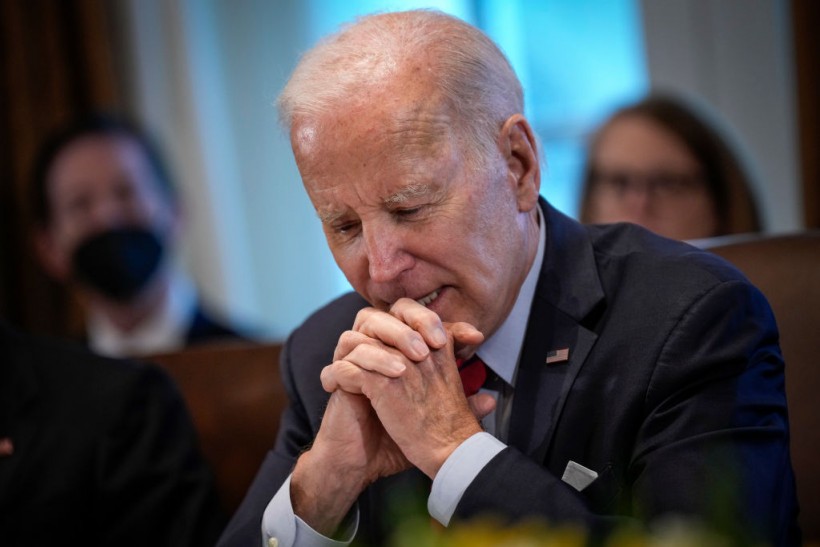
(Photo : Drew Angerer/Getty Images)
The Biden administration will send 1,500 troops to the US-Mexico border in anticipation of an influx of migrants.
-
The Biden administration will send an additional 1,500troops to the southern border
-
Critics compared Biden's decision to Trump's
-
Congress has refused to adopt immigration-related actions
Some Democratic lawmakers have expressed concern over President Joe Biden's decision to dispatch 1,500 active-duty US troops to the US-Mexico border, claiming that the move represents an "unacceptable militarization."
On Tuesday, the White House announced that 1,500 active-duty troops will be deployed to the border for up to 90 days to provide administrative support and address security gaps.
Biden Administration Eyes End of COVID-Era Policy
According to the administration, these forces will not be involved with law enforcement. The militarization of the border by the Biden administration is unacceptable, according to the leader of the Senate Foreign Relations Committee, New Jersey Democrat Robert Menendez.
According to Fox News, Representative Ilhan Omar (D-Minnesota) stated that the policy would only harm "the innocent."
Critics have also compared Biden's decision to that of his predecessor, former President Donald Trump, who deployed active-duty military to the US-Mexico border as migrant caravans approached.
In spite of the fact that Biden frequently criticized these policies, the White House shrugged aside this comparison. Biden's decision coincides with the US and Mexico's announcement of new immigration policies aimed at reducing irregular border crossings by both nations.
US and Mexican officials reached an agreement that would prevent migrants from entering the US from certain South American countries while allowing migrants to enter the country via other routes once pandemic restrictions are lifted next week.
The agreement was disclosed on Tuesday, following a meeting between Homeland Security adviser Liz Sherwood-Randall and Mexican President Andres Manuel Lopez Obrador.
In accordance with the newly negotiated agreement, Mexico will welcome migrants from Venezuela, Haiti, Cuba, and Nicaragua, as well as up to 100,000 migrants from Honduras, Guatemala, and El Salvador who meet specific criteria.
The United States will continue to reject Cubans, Haitians, Nicaraguans, and Venezuelans who unlawfully cross the border.
For Biden, who announced his Democratic reelection campaign a week ago, the decision sends a message to potential border crossers not to attempt the journey. However, it also invites potentially unwelcome comparisons to the policies of Biden's Republican predecessor, whom he frequently criticized.
Meanwhile, Congress has refused to adopt any significant immigration-related actions. White House Press Secretary Karine Jean-Pierre minimized any similarities between Biden's management of immigration and Trump's use of forces during his presidency.
Jean-Pierre stated that DOD personnel have supported CBP at the frontier for nearly two decades, ABC News reported. Thus, this is a prevalent practice. However, some members of Biden's own party opposed the decision.
Read Also: Former FBI Supervisor Arrested Over Jan.6 Riot Involvement, Encouraged Rioters To Kill Officers
US-Mexico Border Issue
Last week, administration officials announced they would work to rapidly screen migrants seeking asylum at the border, deport those deemed ineligible, and punish those who cross illegally into the US or through another country on their way to the US border.
In addition, they will establish centers outside the United States where individuals escaping violence and poverty can apply to legally enter and reside in the United States, Spain, or Canada. Guatemala and Colombia will establish the first processing centers, with others anticipated to follow.
Homeland Security stated that they were working on it. "US Customs and Border Protection is investing in technology and personnel to reduce its reliance on DOD support in the coming years," the agency said in a statement. "We continue to ask Congress for assistance in this endeavor."
The Pentagon's spokesman, Brig. Gen. Pat Ryder, stated that the forces could reach as early as May 10. Per Telegraph via MSN, he added that the mission of the soldiers would be to assist Customs and Border Protection.
It is not the first time the US military has been requested to assist with border security. Presidents George W. Bush, Barack Obama, and Donald Trump have all dispatched thousands of active-duty and National Guard personnel to the region.
Related Article: Trump Civil Trial: Second Accuser Testifies Against Ex-President's Sexual Assault









